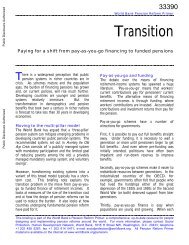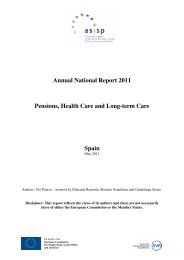Financial Sector Development in Africa: Opportunities ... - World Bank
Financial Sector Development in Africa: Opportunities ... - World Bank
Financial Sector Development in Africa: Opportunities ... - World Bank
You also want an ePaper? Increase the reach of your titles
YUMPU automatically turns print PDFs into web optimized ePapers that Google loves.
The Potential of Pro-Market Activism for F<strong>in</strong>ance <strong>in</strong> <strong>Africa</strong>: A Political Economy Perspective 191<br />
from the potentially predatory behavior of f<strong>in</strong>ancial <strong>in</strong>stitutions. The<br />
CBK, for <strong>in</strong>stance, provides an overview of bank charges to the public to<br />
make it easier for customers to compare them (Candace and Angela<br />
2008, 6); similarly, the Peruvian central bank requires banks to disclose<br />
the “Annual Effective Cost Rate,” which is expressed like an <strong>in</strong>terest rate<br />
but <strong>in</strong>cludes all costs associated with consumer credit, such as evaluation<br />
charges or credit <strong>in</strong>surance premiums (Alliance for <strong>F<strong>in</strong>ancial</strong> Inclusion<br />
2010, 4). Moreover, cost <strong>in</strong>formation associated with f<strong>in</strong>ancial services<br />
has to be published daily <strong>in</strong> newspapers. When this <strong>in</strong>formation was first<br />
published, <strong>in</strong>terest rates dropped by as much as 15 percent <strong>in</strong> six months<br />
(Alliance for <strong>F<strong>in</strong>ancial</strong> Inclusion 2010, 3). However, s<strong>in</strong>ce consumer protection<br />
has only recently been added to the list of priorities on the f<strong>in</strong>ancial<br />
reform agenda, there is a lack of experience with activist consumer<br />
protection, and it is too early to more broadly evaluate the capacity and<br />
will<strong>in</strong>gness of governments to <strong>in</strong>tervene <strong>in</strong> this area.<br />
Many governments cont<strong>in</strong>ue us<strong>in</strong>g <strong>in</strong>struments that were common<br />
dur<strong>in</strong>g market-replac<strong>in</strong>g activism. Examples are credit guarantee<br />
schemes and direct public f<strong>in</strong>ance. Evidence of the effectiveness of<br />
these <strong>in</strong>struments <strong>in</strong> the past decade has—just like past experience—<br />
been mixed at best. In Chile, for <strong>in</strong>stance, the government-owned Banco<br />
Estado has managed to broaden access to f<strong>in</strong>ance for micro- entrepreneurs<br />
by provid<strong>in</strong>g credit while operat<strong>in</strong>g profitably (Benavente 2006).<br />
Benavente, Galetovic, and Sanhueza (2006) show that the Fondo de<br />
Garantía para Pequeños Empresarios (FOGAPE) a credit guarantee<br />
scheme funded by the Chilean government, is also a success. <strong>Africa</strong>n<br />
examples of successful government <strong>in</strong>terventions might <strong>in</strong>clude the<br />
South <strong>Africa</strong>n public bus<strong>in</strong>ess f<strong>in</strong>ance agency Khula Enterprise F<strong>in</strong>ance,<br />
which promotes SME lend<strong>in</strong>g (Sapp Manc<strong>in</strong>i, Yee, and Ja<strong>in</strong> 2008, 7)<br />
and the Tanzanian SME credit guarantee scheme established by the<br />
<strong>Bank</strong> of Tanzania <strong>in</strong> 2005, which <strong>in</strong>volves 50–50 risk shar<strong>in</strong>g. However,<br />
<strong>in</strong> most <strong>Africa</strong>n countries, public banks have not adjusted their bus<strong>in</strong>ess<br />
models, and government schemes fail to recover loans and impose heavy<br />
fiscal costs without reach<strong>in</strong>g their target groups (Honohan and Beck<br />
2007, 99–102). “Smart subsidies” have not yet had the expected<br />
take-up. 13<br />
The examples show that it is difficult to assess the effectiveness of promarket<br />
activism, partly because the policies have been adopted quite<br />
recently, and partly because pro-market activism is a very broad and illdef<strong>in</strong>ed<br />
category. Yet it is possible to draw a headl<strong>in</strong>e conclusion from<br />
exist<strong>in</strong>g experiences: there is, as with market-replac<strong>in</strong>g activism, a broad







